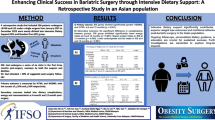Summary
Background
Little is known about the effect of preoperative nutritional counseling on operative outcomes of bariatric surgery.
Aim
To identify and evaluate the effect of nutritional counseling on perioperative morbidity and postoperative weight loss.
Methods
The database of Medline was queried in May 2016. Randomized controlled trials comparing nutritional counseling of any form with standard care and providing data on perioperative morbidity or weight loss were considered. Pooled risk ratio (RR) or mean difference with 95% confidence intervals (CI) were computed.
Results
Three randomized controlled trials were identified. The RR for postoperative complications was 0.80 (95% CI 0.22–2.86) and the mean weight loss was −11.62 kg (95% CI 0.72 to −23.96). There was high evidence of heterogeneity among reports. No data on operative morbidity were available.
Conclusion
Current data are not adequately robust to support preoperative nutritional intervention as an effective modality to prevent perioperative morbidity and to achieve more optimal postoperative weight control. In the absence of opposing evidence, nutritional counseling prior to surgery may be conventionally recommended.



Similar content being viewed by others
References
NCD Risk Factor Collaboration (NCD-RisC). Trends in adult body-mass index in 200 countries from 1975 to 2014: a pooled analysis of 1698 population-based measurement studies with 19·2 million participants. Lancet. 2016;387(10026):1377–96.
Sikorski C, Luppa M, Kaiser M, Glaesmer H, Schomerus G, König HH, Riedel-Heller SG. The stigma of obesity in the general public and its implications for public health – a systematic review. BMC Public Health. 2011;11:661.
Colquitt JL, Pickett K, Loveman E, Frampton GK. Surgery for weight loss in adults. Cochrane Database Syst Rev. 2014. doi:10.1002/14651858.cd003641.pub4.
Melendez-Araújo MS, de Matos Arruda SL, de Oliveira KE, de Carvalho KM. Preoperative nutritional interventions in morbid obesity: impact on body weight, energy intake, and eating quality. Obes Surg. 2012;22(12):1848–54.
Gerber P, Anderin C, Thorell A. Weight loss prior to bariatric surgery: an updated review of the literature. Scand J Surg. 2015;104(1):33–9.
Moher D, Liberati A, Tetzlaff J, Altman DG, PRISMA Group. Preferred reporting items for systematic reviews and meta-analyses: the PRISMA statement. J Clin Epidemiol. 2009;62(10):1006–12.
National Institute for Health Research. International prospective register of systematic reviews 2016. http://www.crd.york.ac.uk/prospero/. Accessed 28 May 2016.
Robinson KA, Dickersin K. Development of a highly sensitive search strategy for the retrieval of reports of controlled trials using PubMed. Int J Epidemiol. 2002;31(1):150–3.
DerSimonian R, Laird N. Meta-analysis in clinical trials. Control Clin Trials. 1986;7(3):177–88.
Higgins JP, Altman DG, Gøtzsche PC, Jüni P, Moher D, Oxman AD, Savovic J, Schulz KF, Weeks L, Sterne JA, Methods Group Methods Group. The Cochrane collaboration’s tool for assessing risk of bias in randomised trials. BMJ. 2011;343:d5928.
Carbajo MA, Castro MJ, Kleinfinger S, Gómez-Arenas S, Ortiz-Solórzano J, Wellman R, García-Ianza C, Luque E. Effects of a balanced energy and high protein formula diet (Vegestart complet®) vs. low-calorie regular diet in morbid obese patients prior to bariatric surgery (laparoscopic single anastomosis gastric bypass): a prospective, double-blind randomized study. Nutr Hosp. 2010;25(6):939–48.
Gade H, Hjelmesæth J, Rosenvinge JH, Friborg O. Effectiveness of a cognitive behavioral therapy for dysfunctional eating among patients admitted for bariatric surgery: a randomized controlled trial. J Obes. 2014;2014:127936.
Gade H, Friborg O, Rosenvinge JH, Småstuen MC, Hjelmesæth J. The impact of a preoperative Cognitive Behavioural Therapy (CBT) on dysfunctional eating Behaviours, affective symptoms and body weight 1 year after bariatric surgery: a randomised controlled trial. Obes Surg. 2015;25(11):2112–9.
Nijamkin MP, Campa A, Sosa J, Baum M, Himburg S, Johnson P. Comprehensive nutrition and lifestyle education improves weight loss and physical activity in Hispanic Americans following gastric bypass surgery: a randomized controlled trial. J Acad Nutr Diet. 2012;112(3):382–90.
Pösö T, Kesek D, Aroch R, Winsö O. Rapid weight loss is associated with preoperative hypovolemia in morbidly obese patients. Obes Surg. 2013;23(3):306–13.
Faria SL, Faria OP, de Almeida Cardeal M, Ito MK. Effects of a very low calorie diet in the preoperative stage of bariatric surgery: a randomized trial. Surg Obes Relat Dis. 2015;11(1):230–7.
Van Nieuwenhove Y, Dambrauskas Z, Campillo-Soto A, van Dielen F, Wiezer R, Janssen I, Kramer M, Thorell A. Preoperative very low-calorie diet and operative outcome after laparoscopic gastric bypass: a randomized multicenter study. Arch Surg. 2011;146(11):1300–5.
Alami RS, Morton JM, Schuster R, Lie J, Sanchez BR, Peters A, Curet MJ. Is there a benefit to preoperative weight loss in gastric bypass patients? A prospective randomized trial. Surg Obes Relat Dis. 2007;3(2):141–5, discussion 145–146.
Gerber P, Anderin C, Thorell A. Weight loss prior to bariatric surgery: an updated review of the literature. Scand J Surg. 2015;104(1):33–9.
Livhits M, Mercado C, Yermilov I, Parikh JA, Dutson E, Mehran A, Ko CY, Gibbons MM. Does weight loss immediately before bariatric surgery improve outcomes: a systematic review. Surg Obes Relat Dis. 2009;5(6):713–21.
Author information
Authors and Affiliations
Corresponding author
Ethics declarations
Conflict of interest
S.A. Antoniou, A. Anastasiadou, G.A. Antoniou, F.-A. Granderath, and A. Kafatos declare that they have no competing interests.
Rights and permissions
About this article
Cite this article
Antoniou, S.A., Anastasiadou, A., Antoniou, G.A. et al. Preoperative nutritional counseling versus standard care prior to bariatric surgery. Eur Surg 49, 113–117 (2017). https://doi.org/10.1007/s10353-016-0459-4
Received:
Accepted:
Published:
Issue Date:
DOI: https://doi.org/10.1007/s10353-016-0459-4




